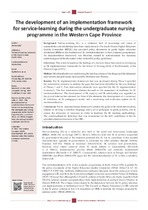The development of an implementation framework for service learning during the undergraduate nursing programme in the Western Cape Province
Abstract
BACKGROUND: Service-learning (SL) is a contested field of knowledge and issues of sustainability and scholarship have been raised about it. The South African Higher Education Quality Committee (HEQC) has provided policy documents to guide higher education institutions (HEIs) in the facilitation of SL institutionalisation in their academic programmes. An implementation framework was therefore needed to institutionalise the necessary epistemological shifts advocated in the national SL policy guidelines. OBJECTIVES: This article is based on the findings of a doctoral thesis that aimed at developing an SL implementation framework for the School of Nursing (SoN) at the University of the Western Cape (UWC). METHOD: Mixed methods were used during the first four phases of the design and development intervention research model developed by Rothman and Thomas. RESULTS: The SL implementation framework that was developed during Phase 3 specified the intervention elements to address the gaps that had been identified by the core findings of Phases 1 and 2. Four intervention elements were specified for the SL implementation framework. The first intervention element focused on the assessment of readiness for SL institutionalisation. The development of SL capacity and SL scholarship was regarded as the pivotal intervention element for three of the elements: the development of a contextual SL definition, an SL pedagogical model, and a monitoring and evaluation system for SL institutionalisation. CONCLUSION: The SL implementation framework satisfies the goals of SL institutionalisation, namely to develop a common language and a set of principles to guide practice, and to ensure the allocation of resources in order to facilitate the SL teaching methodology. The contextualised SL definition that was formulated for the SoN contributes to the SL operationalisation discourse at the HEI.

